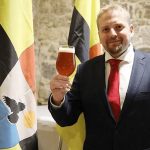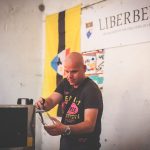The 20th D10e and 3rd Liberland Anniversary conference concluded in Novi Sad in Serbia on April 15, 2018. It was quite a show, and the self-proclaimed Free State of Liberland is quickly becoming a rising star of the Bitcoin/blockchain community, with all the hundreds of millions that come with it. Meanwhile, in eastern Croatia…
“I made 100 million dollars last year. I’ll get the drinks,” said my American drinking partner in the smoking lounge of the Sheraton in Novi Sad.
“I just launched my first ICO, raising 11.5 million dollars,” said the immensely likeable former Afghan refugee turned Dutch businessman during our riverside dinner. He was just 30.
“I got into Bitcoin back in 2016. It was a great decision,” said the amiable former dentist from the UK, as we cruised down the Danube.
“And an amazing thing just happened now, as I went to get a bottle of water,” said one of the key conference speakers. “I met an Israeli conference participant who was also getting water, and he agreed to contribute $50,000 to the upcoming Liberland ICO.”
It seemed that everyone at this conference had tens of millions of dollars except me and my colleague. Was I really in the right place? I was looking for the conference on Liberland, a tiny slither of marshy coastal land on the west banks of the Danube between Croatia and Serbia, where a Czech national, Vit Jedlicka, arrived in April 13, 2015 with his girlfriend and another friend, planted a flag in the land, and claimed the 7km2 territory under a law called Terra Nullius – incredibly, especially after the recent bloody conflict, neither Serbia nor Croatia had claimed the land since the breakup of former Yugoslavia. Serbia because they had no interest in land west of the river in the final settlement, Croatia because they eyed bigger parcels on the east of the river according to the 19th century cadastral maps when the Danube flowed differently. Jedlicka saw his opportunity and nipped in to claim the land he wanted to start an entirely new libertarian country under the motto, Live and Let Live.
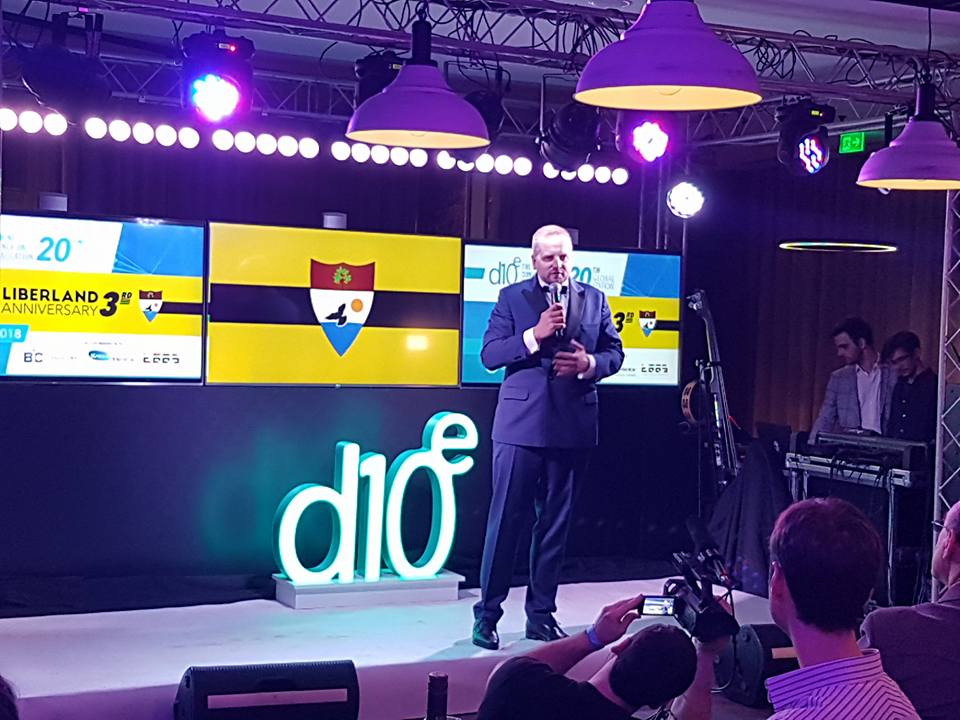
The story made global headlines and was broadly dismissed as a publicity stunt. And when the Croatian authorities realised President Jedlicka was serious, they arrested and briefly imprisoned him as he tried to enter Liberland from Croatian territory (his crime was to leave Croatia illegally, a de facto admission that Croatia did not claim the territory in which he was interested) and then more controversially, when he tried to enter Liberland from the international waters of the Danube, a case which the Croatian courts agreed should be heard by a higher authority.
I have been following the Liberland story from the start. At first, I thought Jedlicka was nuts, but wished him well, in the same way as we all rejoiced when Leicester City won the Premier League against all odds last year. It had echoes of a novel by my literary hero, Evelyn Waugh, and when the President invited me to attend the first anniversary conference in a village north of Osijek in 2016, I just knew I had to go. The continued harassment by the police added to the surreal nature of the event, where we all had to switch off our WiFi access for the opening speech from the president. He had to address us via Skype from across the river in Serbia, having been denied entry by the Croatian authorities, despite being an EU citizen with no criminal record – this at a time when 650,000 migrants were wandering through Croatia, many without any papers whatsoever. For an example of the majesty of the lunatic asylum that is the modern-day Croatia, I encourage you to read my trip report from the first conference two years ago, Reflections on a Weekend in Alice in LiberWonderland.
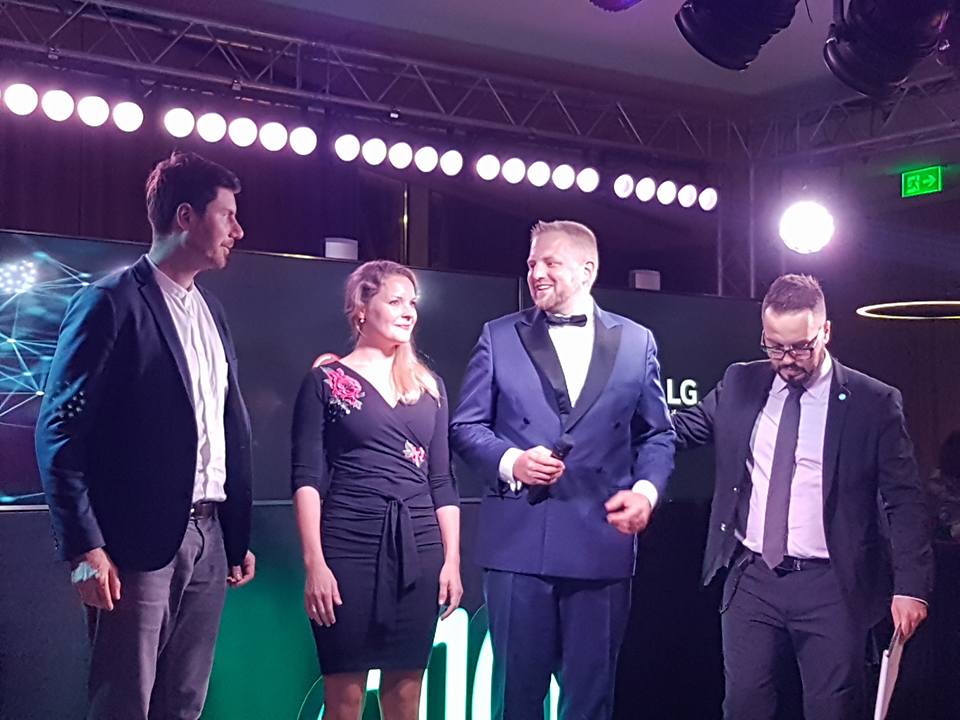
Fast forward two years, and things were looking a little more prosperous for the micro-nation, whose size makes it bigger only than the Vatican and Monaco in European state terms. Intermittent WiFi and Croatian police harassment were exchanged for the comfort of a three-day event in Hotel Sheraton in Novi Sad, a 90-minute drive from the closest Serbian river town to Liberland. And while the audience and keynote speakers two years ago were rather eclectic – it was a rather surreal feeling sitting next to The Daily Telegraph listening to the founder of The Pirate Party, Rick Falkvelge, a party formed just over a decade ago and now the leading party in Iceland, for example – this year’s conference, while true to the original ideals of Liberland, had a much bigger focus on economic power.
Bitcoin power.
We will come to that below, but a clearly relaxed President Jedlicka welcomed one of Croatia’s more controversial MPs to the stage, to help in the distribution of diplomatic passports to those volunteers whom the President has deemed are playing a significant role in progressing the cause. Ivan Pernar MP was a keynote speaker last year, following that appearance by addressing the issue of Liberland in the Croatian Parliament, a major step forward in terms of publicity in attempts to engage Croatia in dialogue.
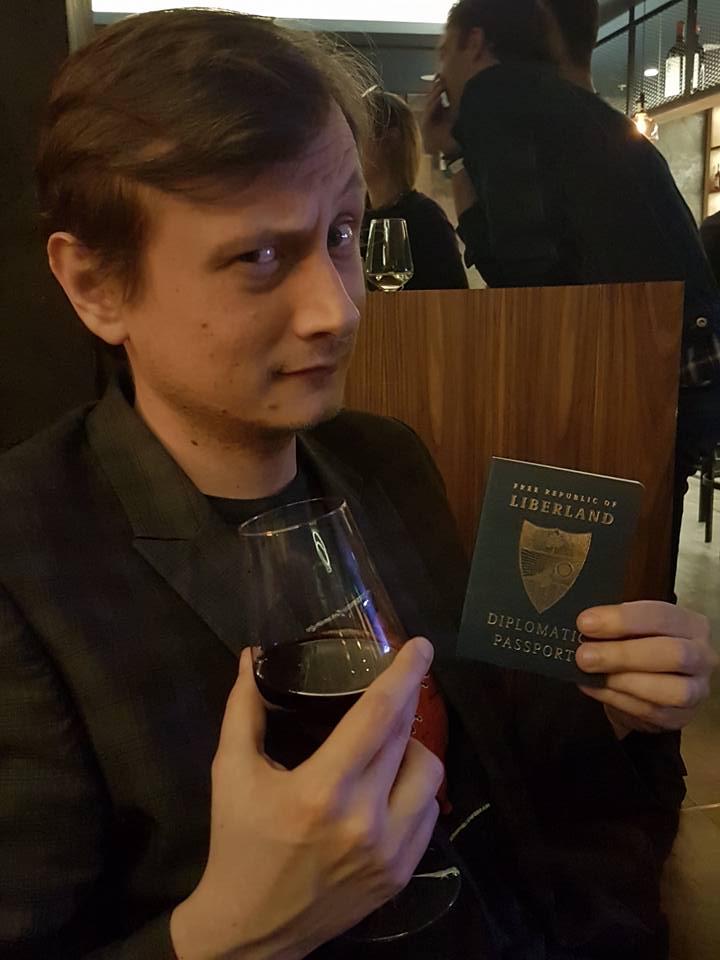
The passports looked extremely authentic, and have already been accepted in at least three countries. Nation building takes time, but Liberland seems to be off to a good start.
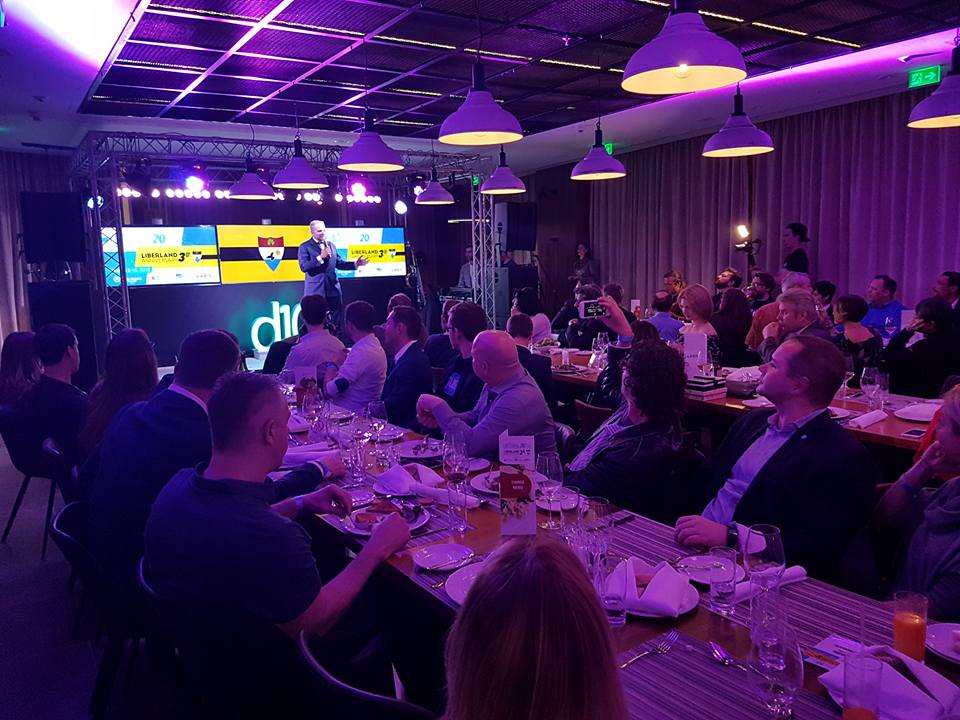
The President addressed the conference firstly over a welcome gala dinner at the Sheraton, and was greeted by an enthusiastic crowd.
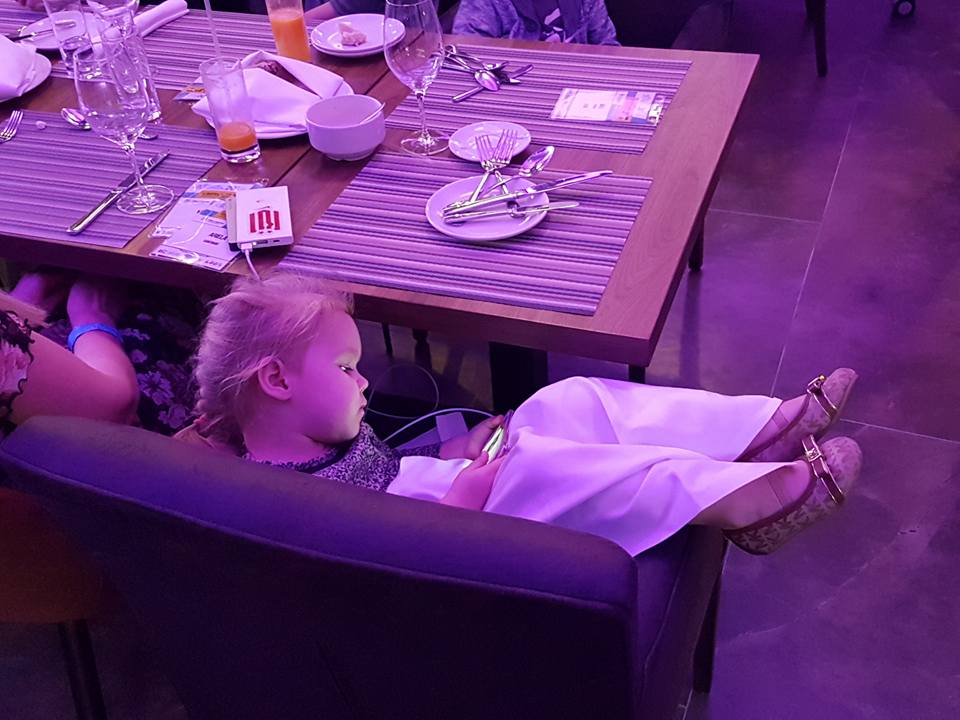
And while the majority hung onto his every word, the President clearly has some work to do to engage the youngest generation in the concepts of cryptocurrency and libertarianism. It was a rather nice feature of this uber-friendly conference that families and kids were very welcome.
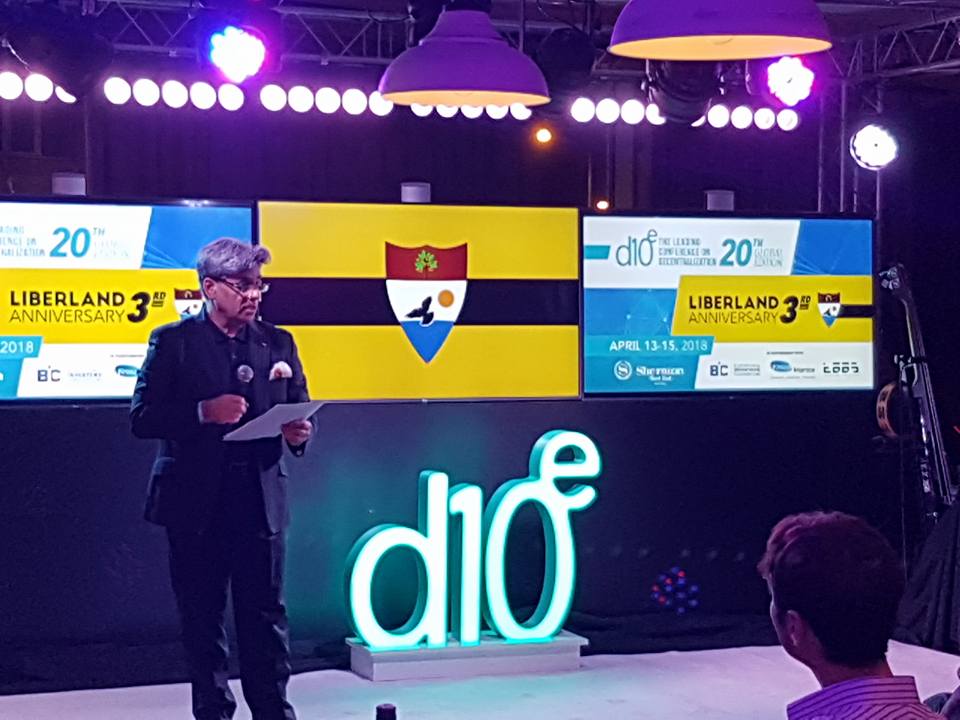
One of the things that always strikes me is the sheer internationalism of the Liberland project. With more than half a million applications for citizenship, it feels at times like watching the air stewardesses of Emirates. The Cabinet of six is made up of nationals from Czech Republic, Poland, USA, Slovenia and this man, Secretary of State, Dr Tariq Abbasi MBE.
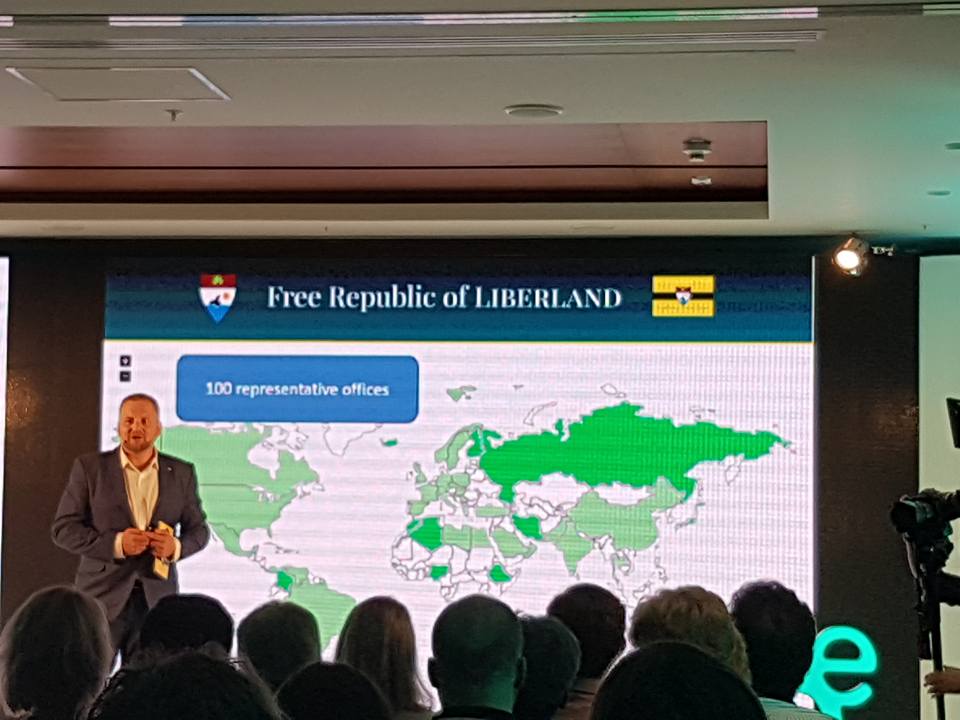
And so to business the following morning, as President Jedlicka gave an update on Liberland progress. Representative offices in over 100 countries in just three years.
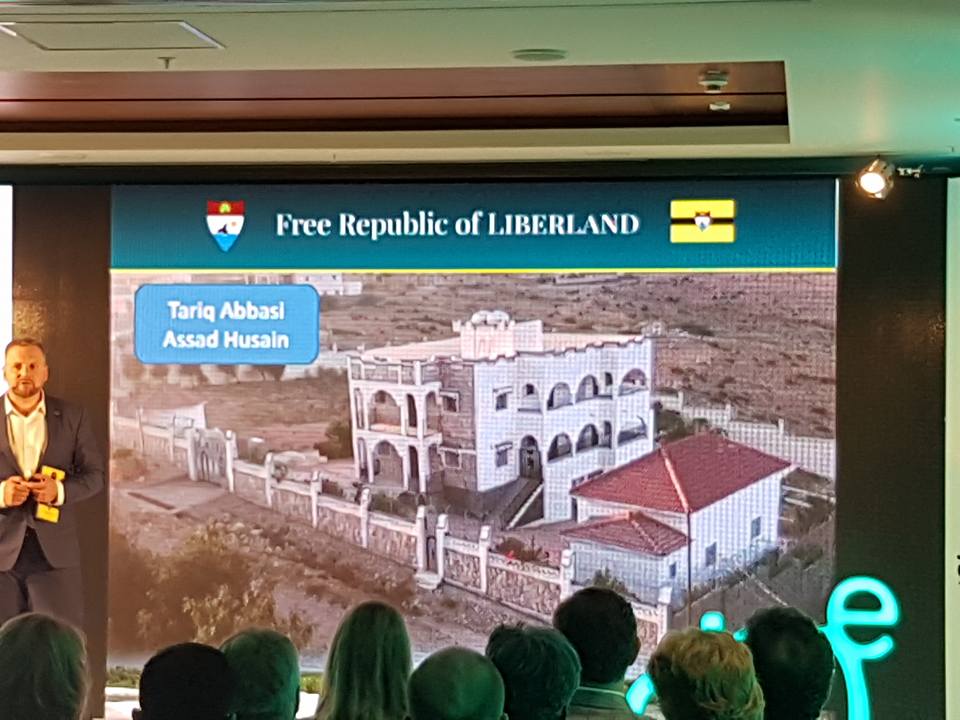
A first physical embassy, in Hargeisa, Somaliland. The two countries have signed a memorandum of understanding, and a trade delegation of 20 Liberlanders are set to visit the Horn of Africa shortly, bringing with them much-needed technology know-how and other skills.
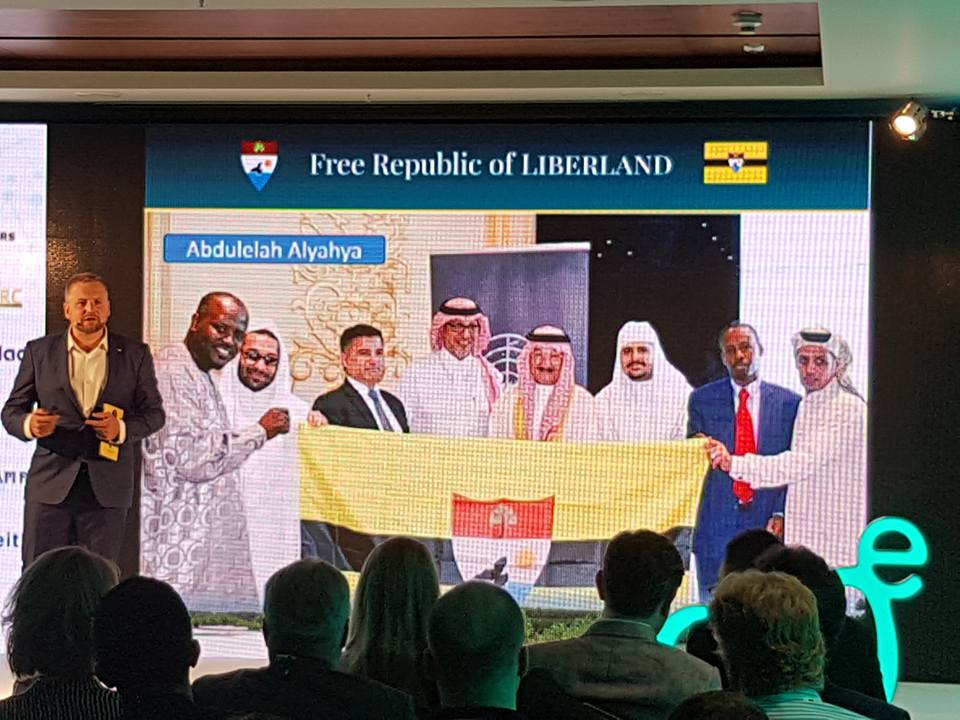
An impressive overview of international Liberland meetings. President Jedlicka has visited some 60 counties in the last 12 months.
Among the many highlights of those travels, one of the top ones was awarding Dr. Ron Paul citizenship of Liberland. The young nation’s supporters are truly all over the globe and in increasingly influential positions.
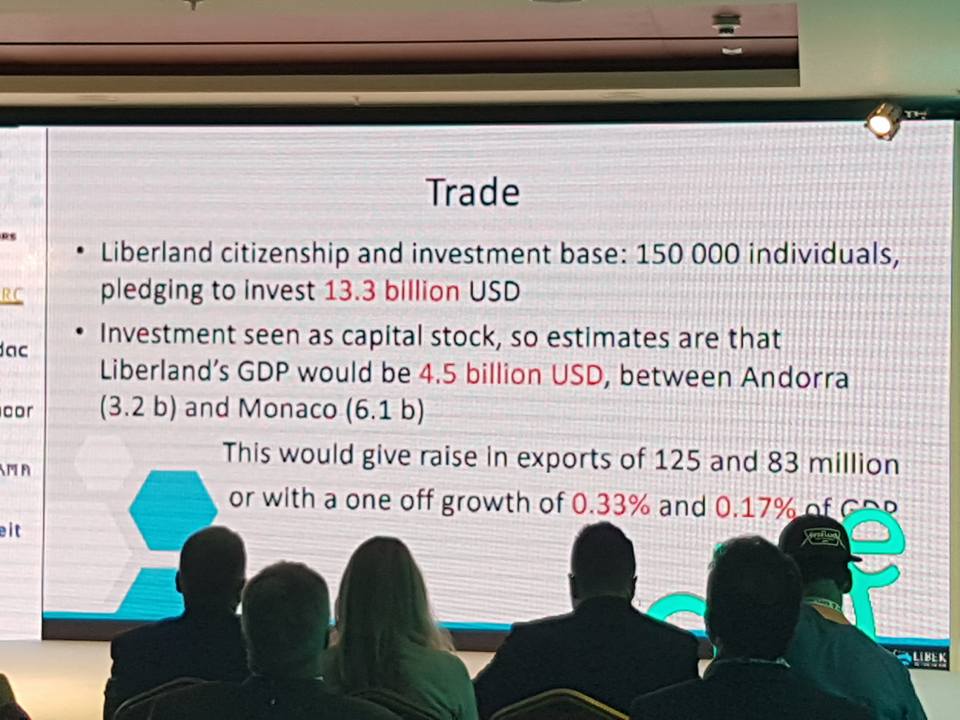
Should Liberland get the recognition it claims and be allowed to develop, the numbers are looking pretty sweet for this Balkan backwater unwanted by anyone and forgotten by all (at least until someone else wanted it). People are attracted to the Liberland project for so many different reasons. Apart from following the bizarre nature of Liberland’s beginnings, the closer I looked, the more I got interested from the Croatian angle. Liberland borders the eastern region of Slavonia, once one of the richest and most fertile parts of the country, today the most depressing place in all Croatia, as tens of thousands of the region’s youth heads to Germany, Ireland, anywhere… in search of a job and a better economic future. In the three years since Liberland has grown from three people and a flag to this outstanding conference with a net worth of attendees in the billions, Slavonia continues to empty, with tens of thousands of its youth heading west in those last three years.
No economic opportunities. No hope. What if there was a project that could not only guarantee jobs, but could play an active part in regenerating Slavonia and the wider region?
A project on unwanted and unclaimed land (just 7km2) where an injection of more than 13 billion dollars was pledged if it was allowed to exist.
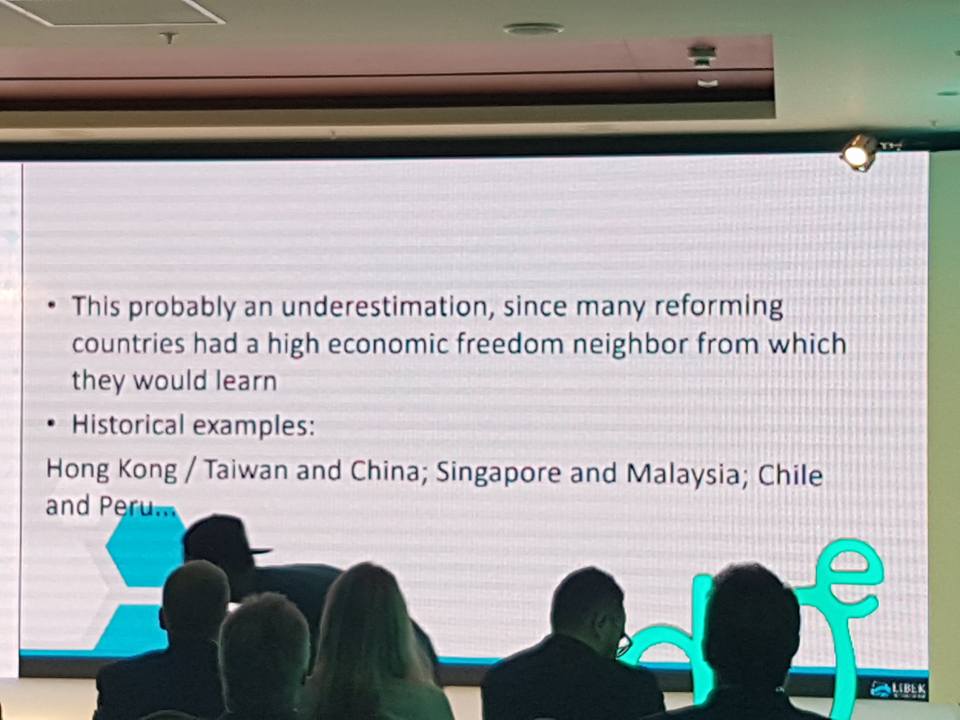
A project which, like other similar examples, would benefit its neighbours economically.
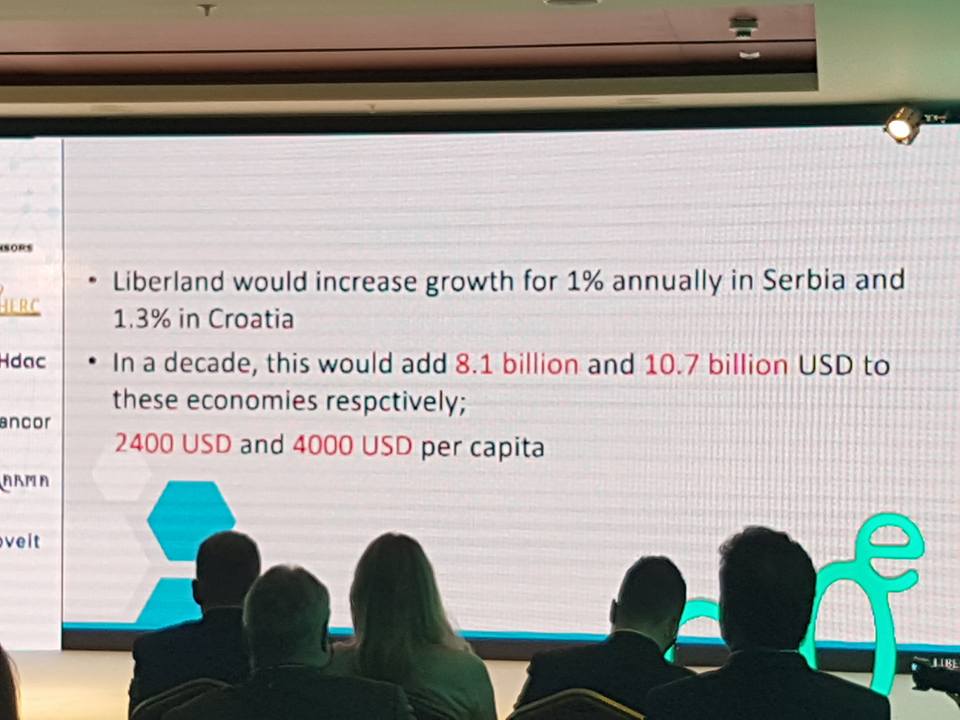
A project which would bring a longterm boost to the economies of its neighbours. The Liberland guys asked my opinion on how best to approach Croatia to partner on this project. The answer to me is clear – with numbers, statistics, jobs. If recognised by its neighbours, Liberland would build a town of 30,000 inhabitants. It would need materials, builders, local infrastructure such as Osijek Airport, things to see and do at the weekend for its inhabitants. The majority of all that could and would be provided by Slavonia. Fulltime jobs, new businesses, a regeneration of this proud but emaciated region. And for those who scoff, what is your plan to prevent Slavonia emptying completely by 2050?
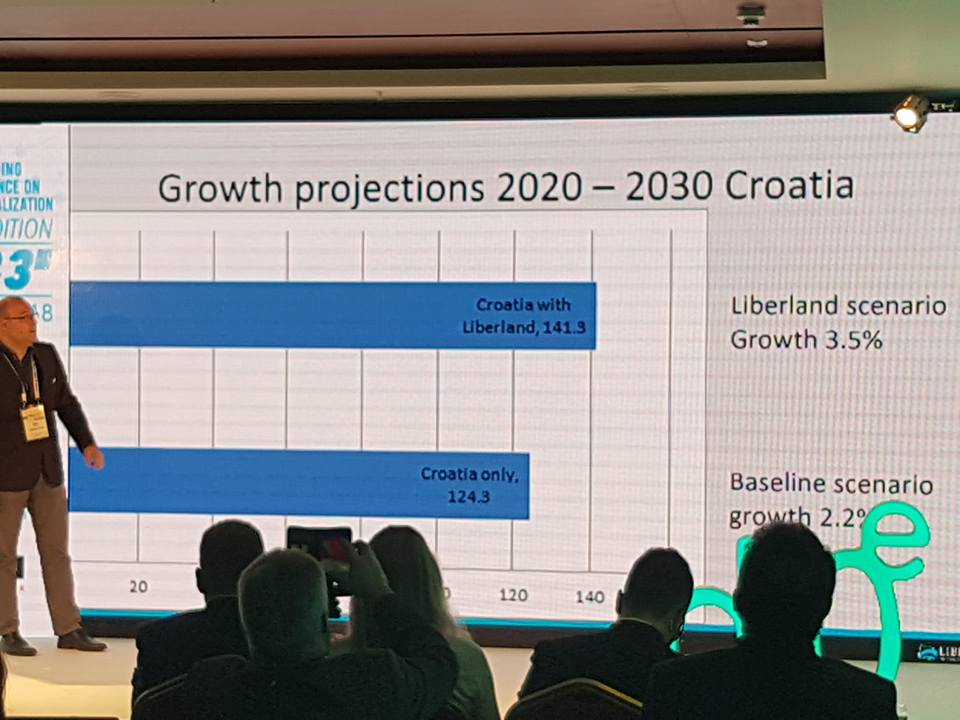
Is the Liberland project total fantasy? Looking around the room, I was obviously not the only one who was interested enough to come to the conference. And just the very thought of the number of serious investors taking part, and ready to part with their money, compared to Croatia’s attempts to attract foreign investment for project gave pause for thought. What if…
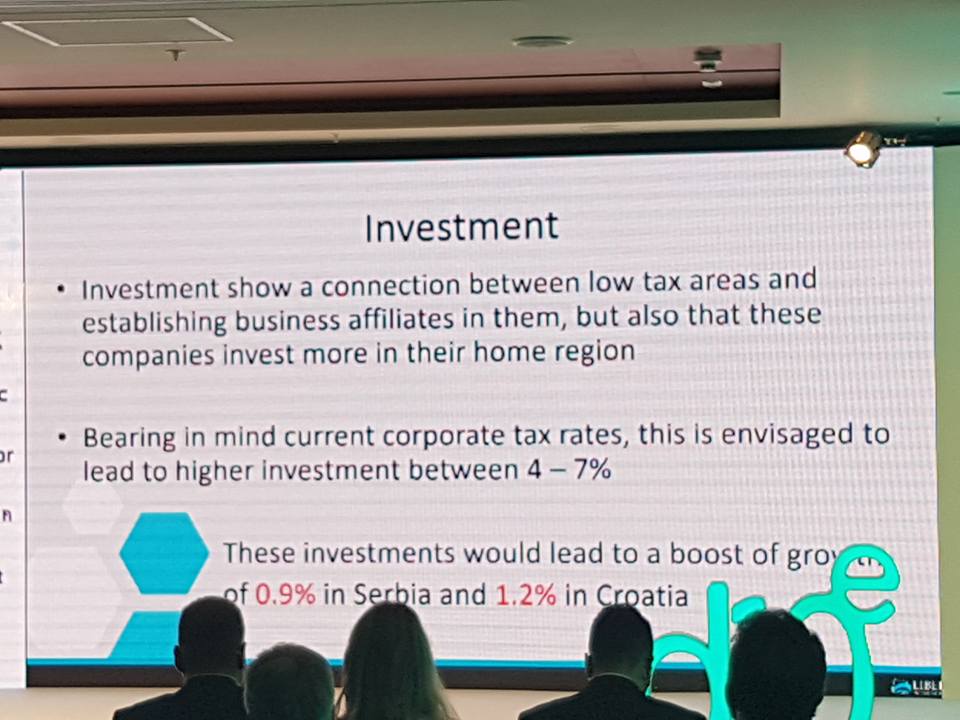
It would be hard to argue that the largely depopulated area is going to become an economic powerhouse with the two current governments deploying their know-how and resources.
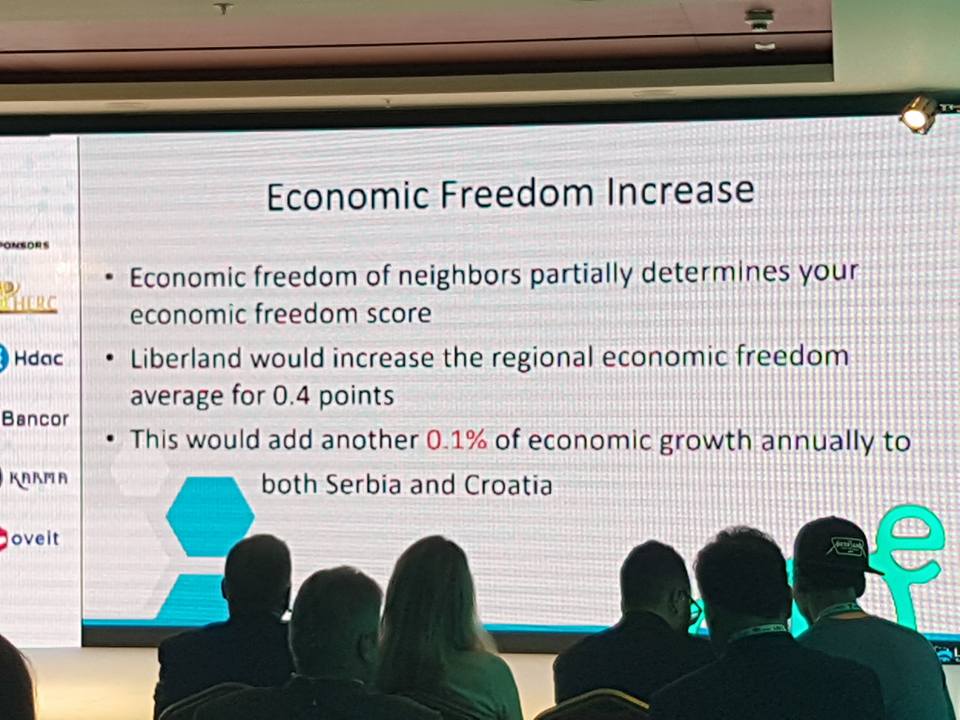
And successful neighbours is no bad thing.
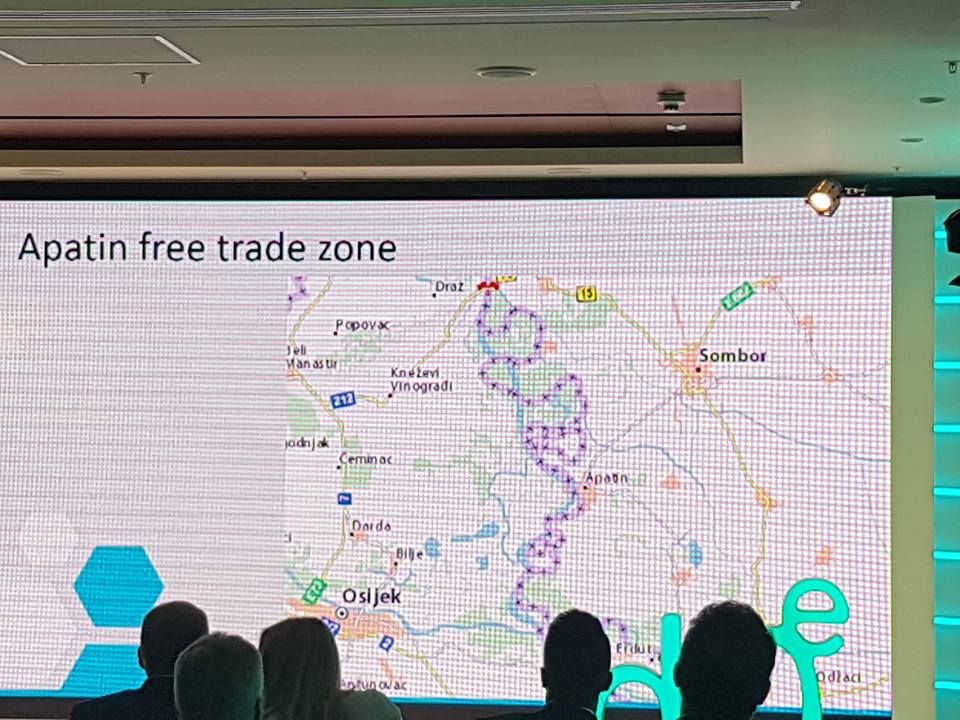
One man who seems to agree was the Mayor of Apatin, the closest town to Liberland on the Serbian side. Not only does the mayor allow Liberland officials to pass freely around his town and allow them to moor their boats in the Apatin marina, but he also has a free trade zone under his jurisdiction. Having seen so many foreign investors looking at the Liberland project, it was not a huge conclusion to draw that this might be good for business. An economically strong small nation next door with a need to outsource some of its requirements to its neighbours might well be good for the free trade zone.
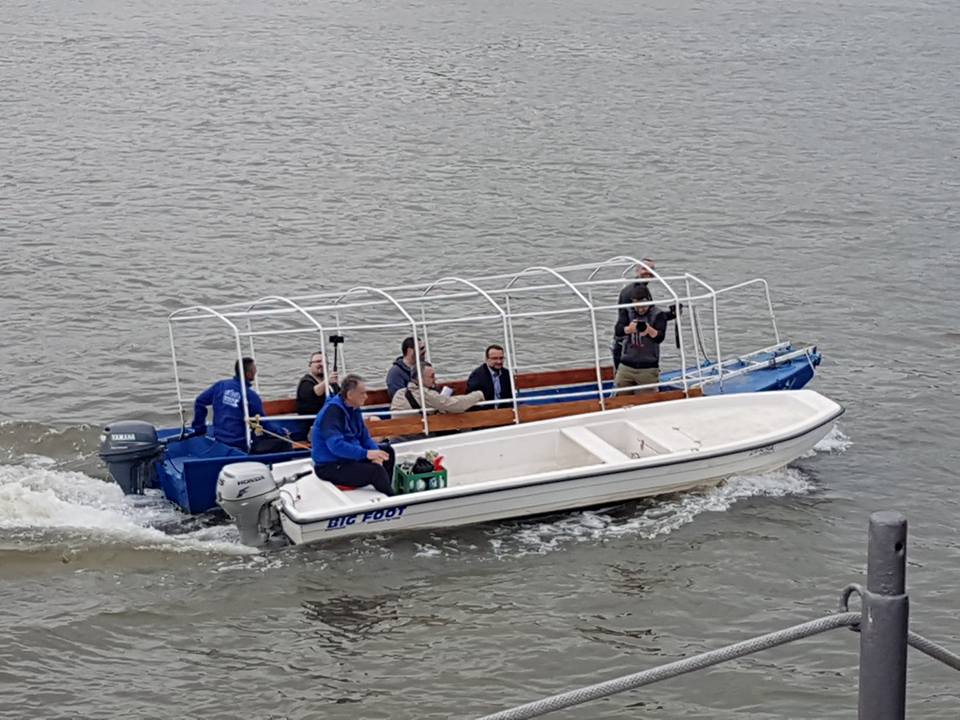
And while the discussions with the Serbian government may be some way off recognition, at the local level things are starting to happen. The mayor was a welcome guest at the Liberland gala dinner, and here he is on the boat trip to Liberland. A trip which, as usual, was accompanied by a strong Croatian police presence to prevent anyone landing at Liberland.
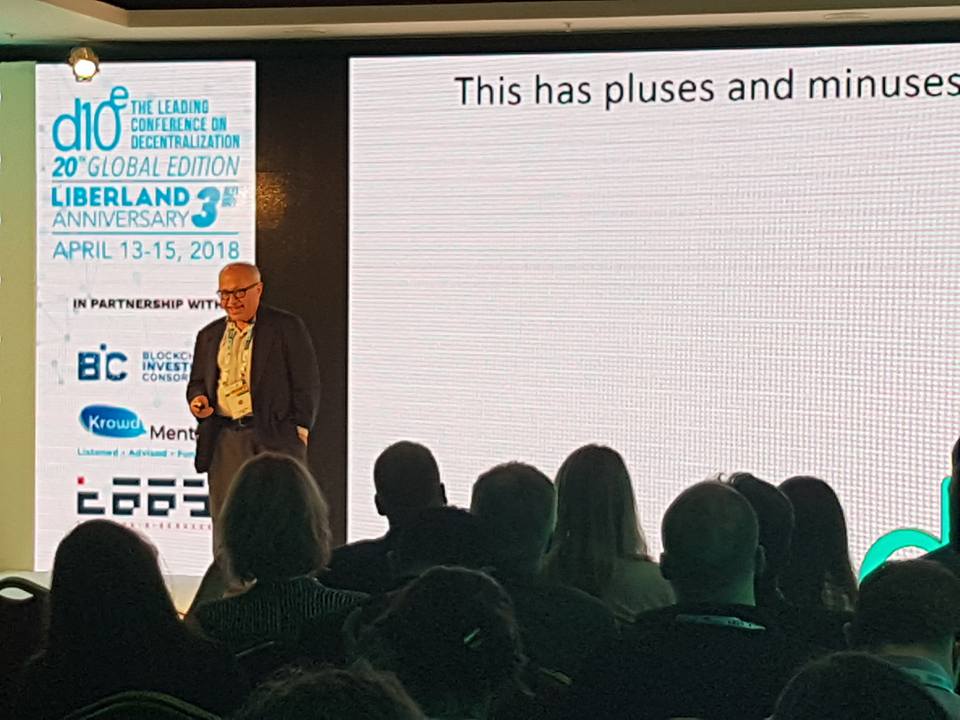
The impressive list of speakers included David Friedman, the American economist, physicist, legal scholar, and libertarian theorist, who is known for his textbook writings on microeconomics and the libertarian theory of anarcho-capitalism, which is the subject of his most popular book, The Machinery of Freedom.
One of the things that was very different about this conference to the one two years ago was the much heavier influence on business, blockchain and the economy, and it took me a day or so to figure out why. While Liberland the country remains the initial goal, the concept of Liberland, of which cryptocurrencies and the blockchain are essential components (it would be interesting to know how much the state coffers of Liberland were boosted by the Bitcoin surge), the concept of a country governed by the principles of Liberland has made it something of a darling to the fashionable blockchain crowd. One of the main reasons Novi Sad was enjoying some bigger spenders than usual at the conference.
Croatian MP Ivan Pernar addressed the conference – you can watch his speech in the video above.
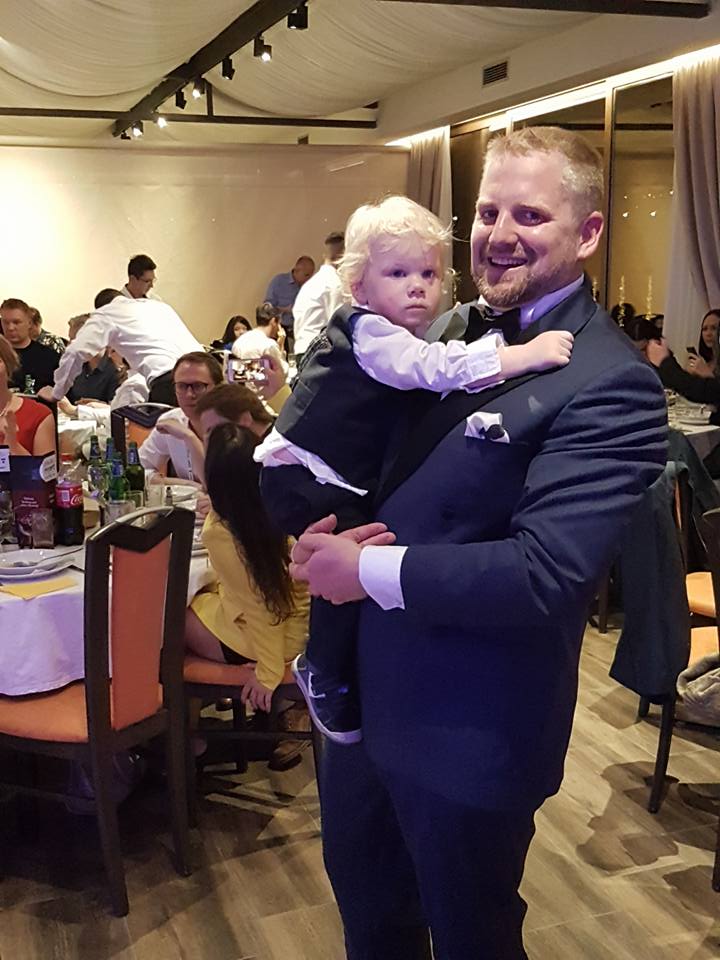
Day two finished with dinner on the river just outside town, and Jedlicka Junior controlled the dance floor for a while.
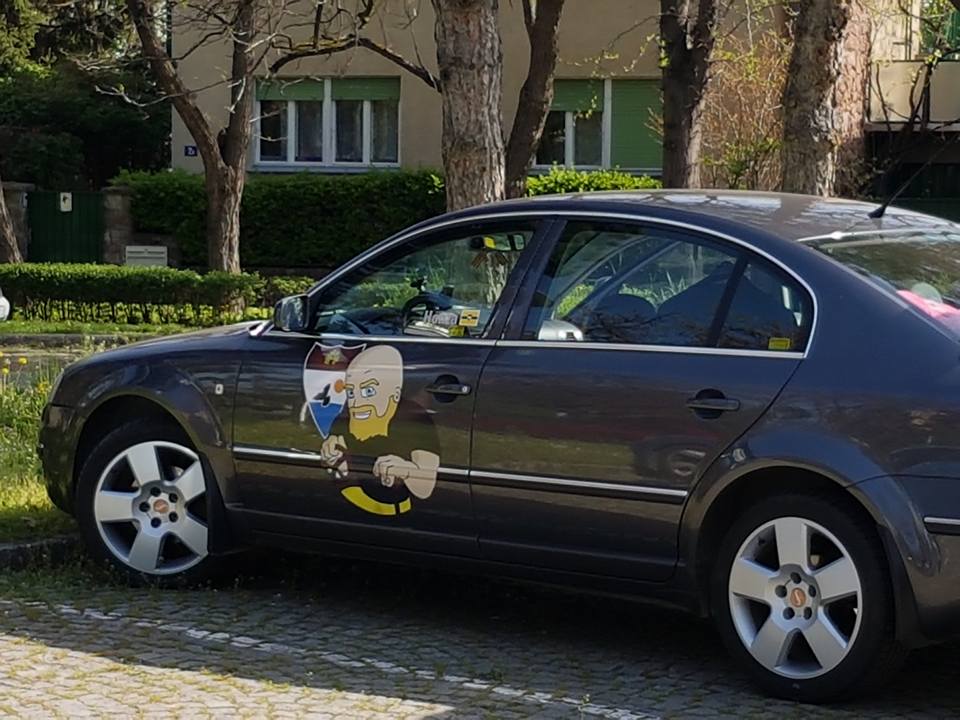
Of course, a visit to Liberland (or at least the waters close by if the Croatian police were preventing any landings) was a highlight for all. Most went to Apatin by bus, some with Liberland vehicles, official or otherwise.
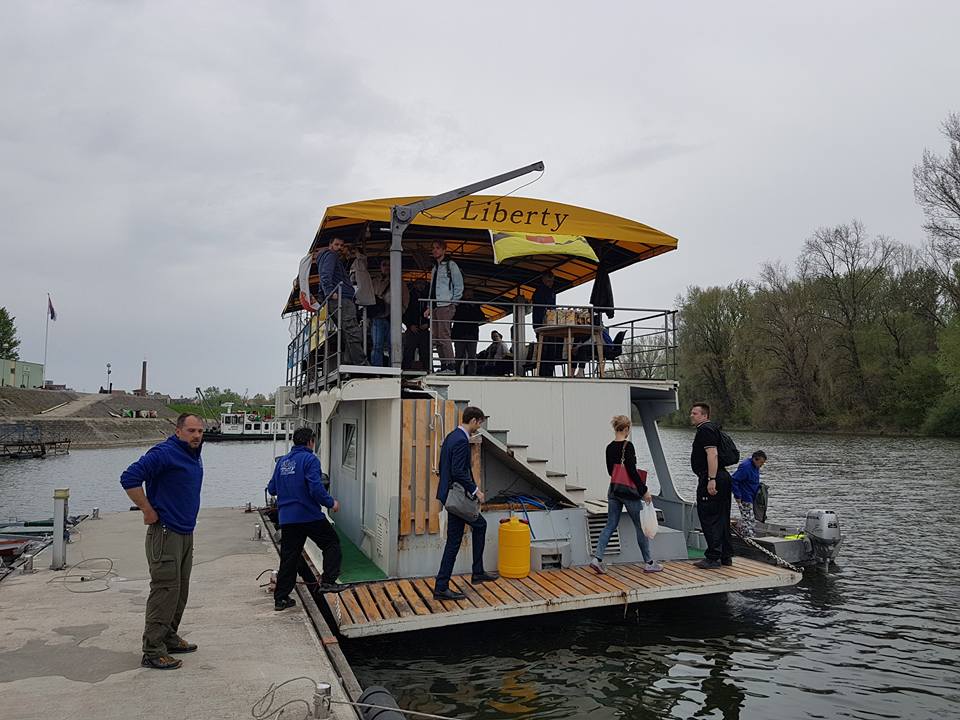
A rather eclectic flotilla awaited the conference delegates at the harbour in Apatin, the pride of the fleet being Liberty.
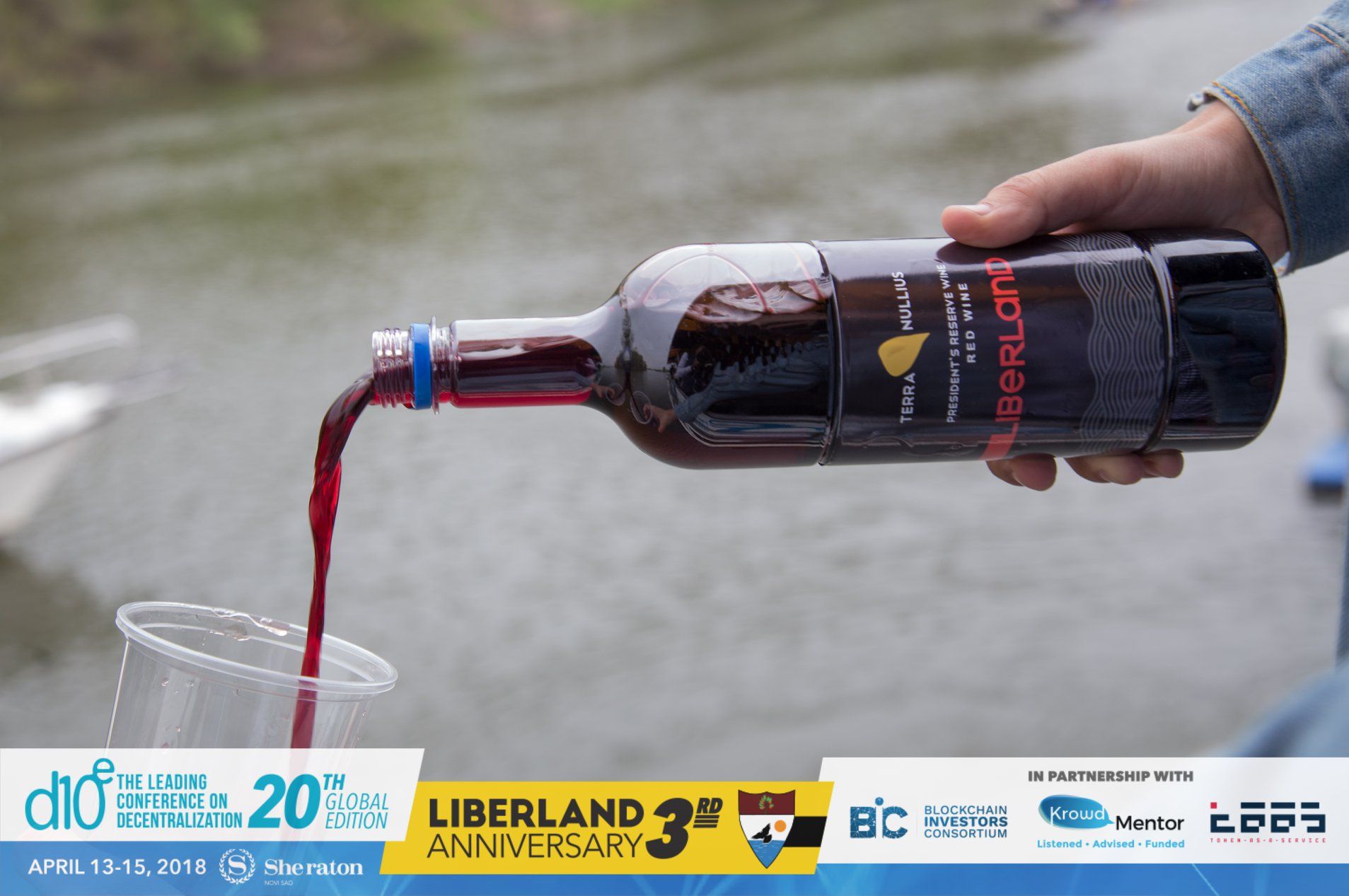
There was plenty of refreshment along the way. Liberland refreshment.
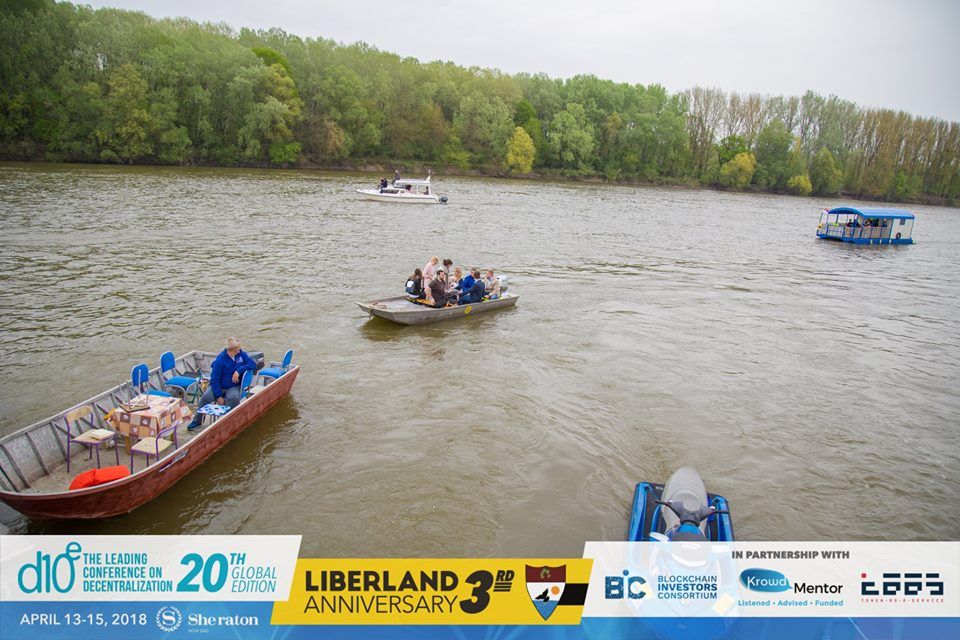
Perhaps not the most modern flotilla to grace the waves, but when one is heading to the freest country in the world, does it really matter?
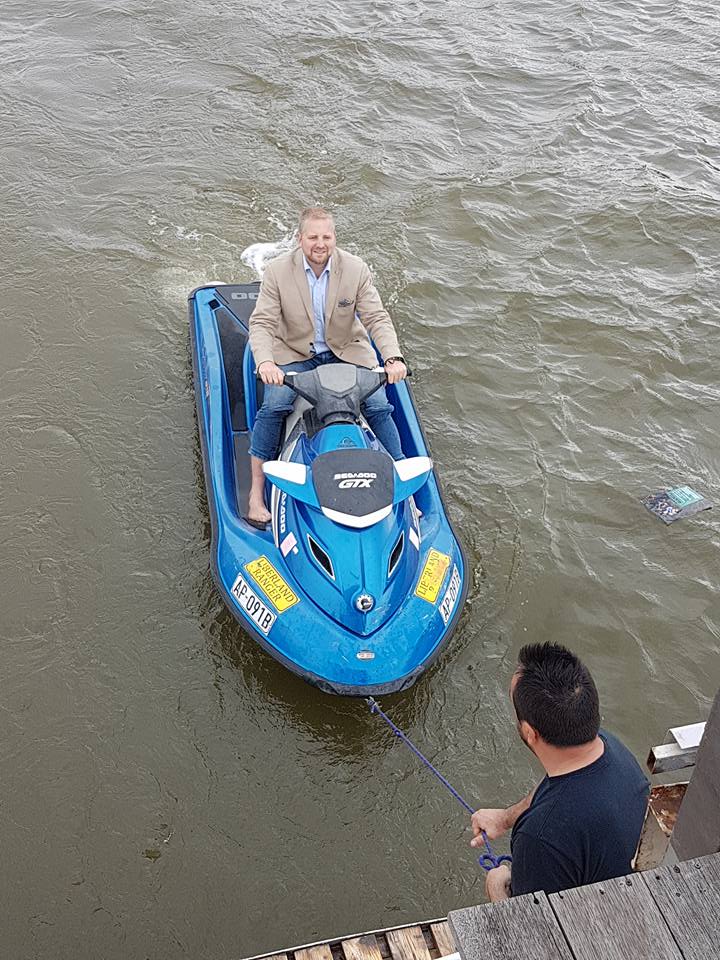
Off came the presidential shoes and socks for the presidential motorcade to be put into action. With so many boats, the President wanted to make himself available to all, and he energetically moved between boats during the voyage to chat to all.
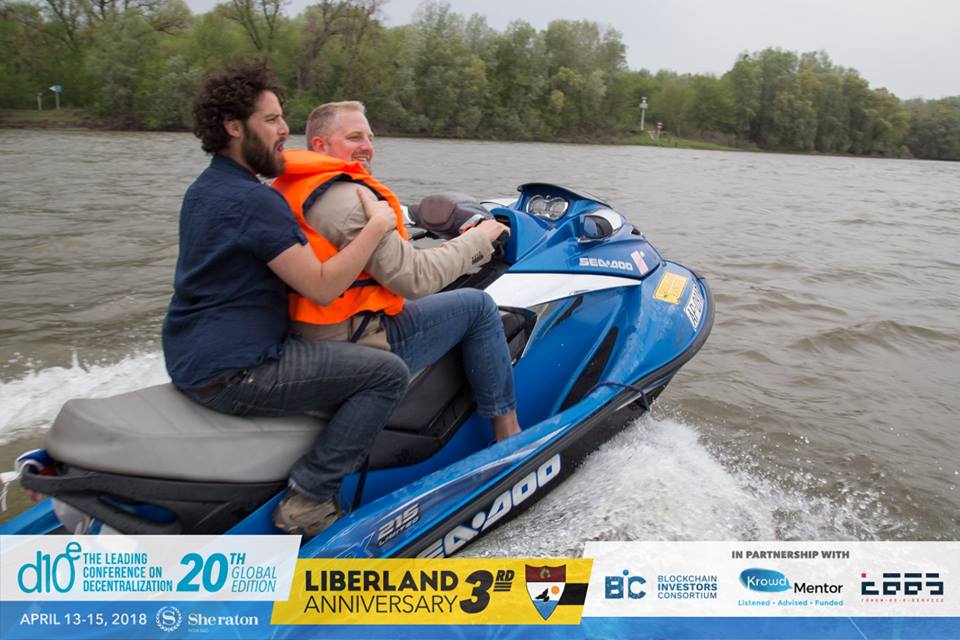
Memories of a lifetime for some, including this young American writer who was researching for a book on countries which do not officially exist. You can’t beat a personal jetski ride with the President for credibility.
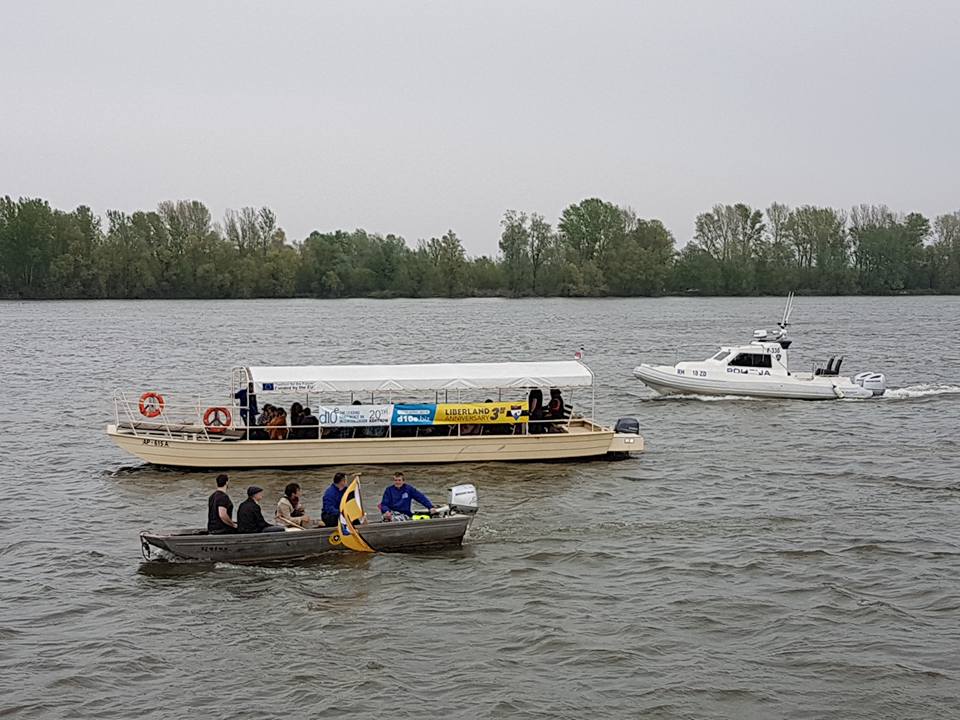
It wasn’t long before we had company – Croatian police company.
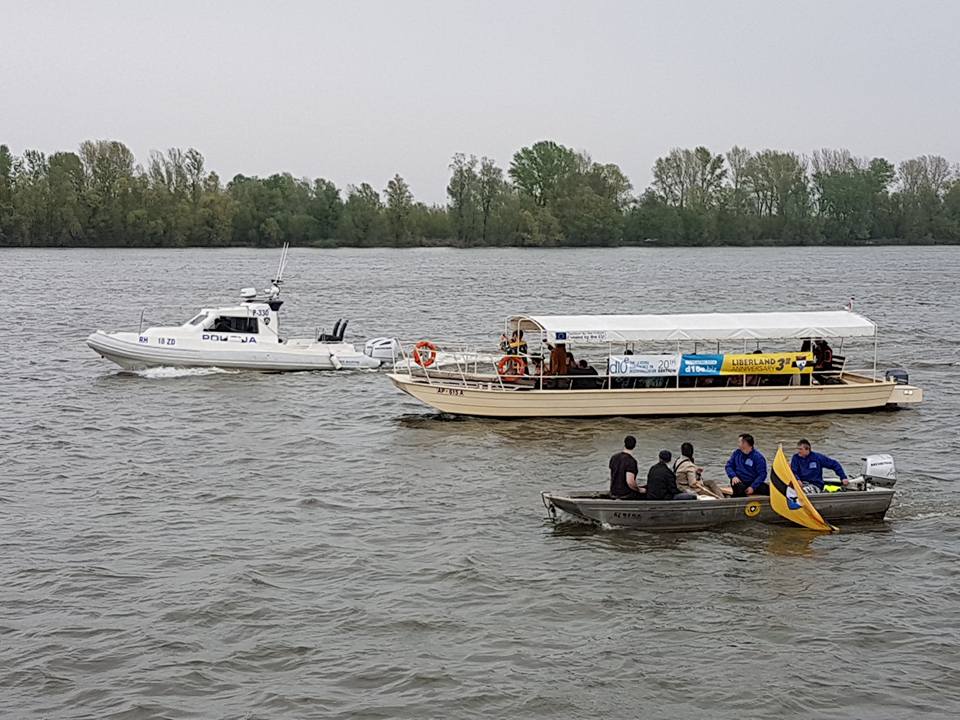
Their boats were a little faster than ours…
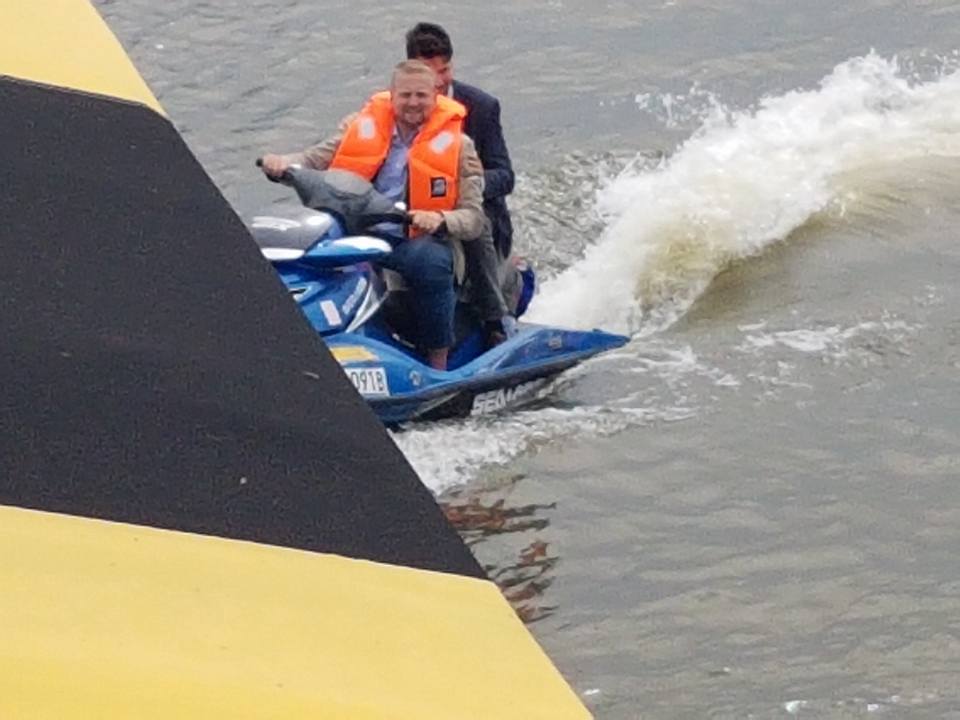
The President, meanwhile, was undeterred, giving MP Pernar a tour of the coast.
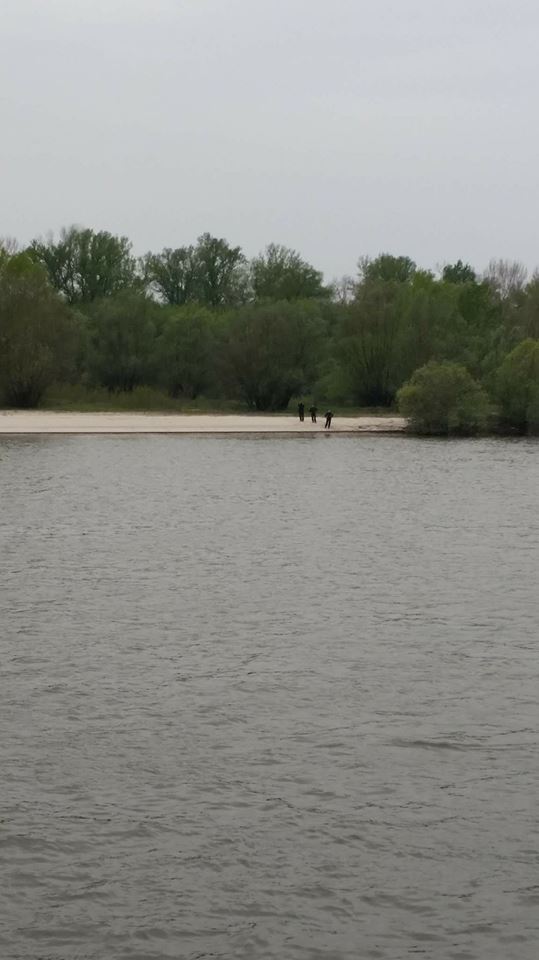
As Serbia’s local mayor was taking part on the excursion, the Croatian police were ensuring there would be no visit to Liberland proper. At least six police officers in two groups of three were guarding the sandy beach at Liberty Island in the middle of the Danube. Combined with at least three patrol boats, the Croatian police presence (at least the visible one) was at least 12 people.
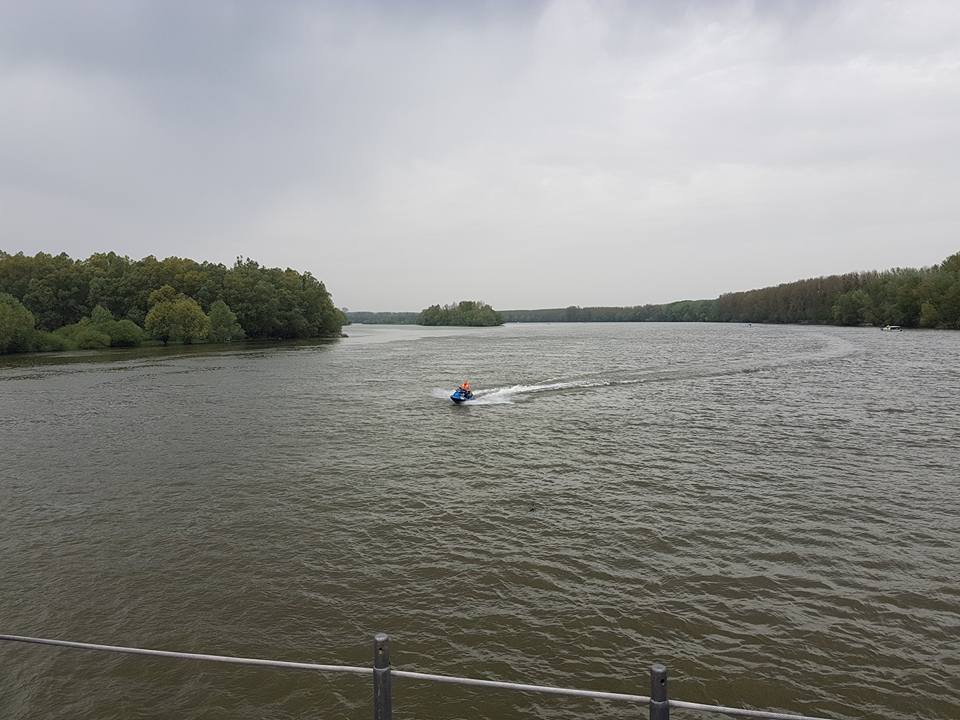
As long as the President conducted his business in the middle of the river, everything remained calm. He did look as though he as having a rather jolly time.
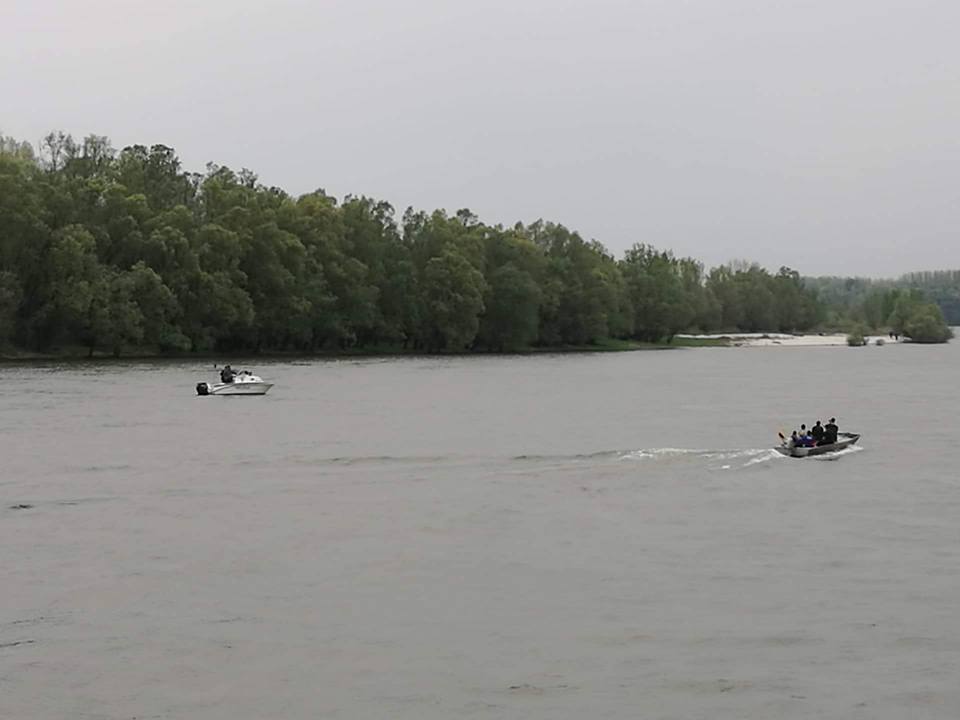
Croatia has yet to respond to any overtures from Croatia, but they do follow the Liberland Facebook page, it seems. This is the scene approaching Liberty Island on Saturday. A patrol boat to the left, police officers on the beach preventing anyone coming. The land is not guarded all the time, however, only it seems when Liberland announces it is coming. A colossal waste of Croatian police time and money.
Three years on, Liberland is getting stronger. Getting recognition for the land it claims will take time, if it ever happens, but there is no doubt that the project is gaining momentum. More than Liberland the country, Liberland the concept has made huge progress in the last three years, particularly among the libertarian and blockchain communities. And while it may still be discussed as a joke by many and a publicity stunt by some, the progress and respect the Liberland project has made on an investment and economic front is quite breathtaking.
After this weekend, I am convinced that Liberland will succeed in some shape or form, perhaps on this parcel of land, perhaps not. As for Slavonia, will there be many more opportunities like this before the last person turns off the light as they emigrate well before 2050?


